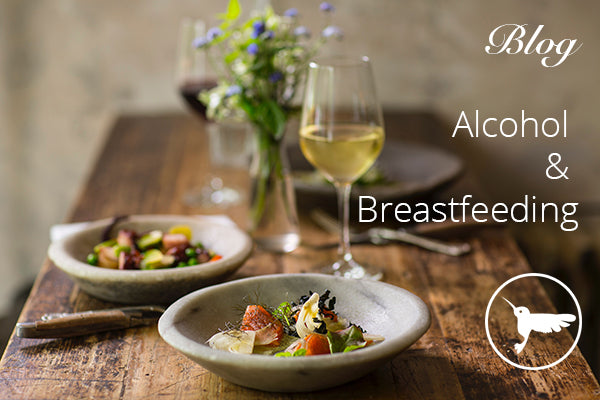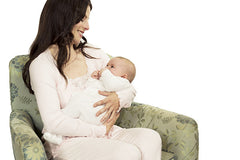-
SHOP Art
- Art Prints
-
Gift Shop
- Artist Blog
- Learn
- My Story
- Contact
- Exhibitions
-
February 02, 2015

After abstaining from drinking alcohol during pregnancy you may questioning when and how much you can drink whilst nursing your baby. Whilst it’s generally recommend to avoid alcohol in pregnancy, the advice for breastfeeding mums is a little more relaxed. Whether you simply want to enjoy a glass of wine with dinner or celebrate an occasion with a few drinks, here’s what you need to know.
1. Firstly you need to be aware of how many units of alcohol can be found in an alcoholic drink. This NHS guide should help. For example a standard 175ml glass of red/white/rosé wine or champagne contains 2.1 units whilst a single 25ml shot of spirits has 1 unit, a 330ml bottle of 5% lager is worth 1.7 units.
2. Drinking heavily whilst breastfeeding can affect your child’s development and inhibits your milk let down. However various sources suggest that occasionally drinking one or two units of alcohol whilst breastfeeding won’t harm your infant, with a few organisations warning to wait until your baby is older than 3 months to allow their body (liver) enough time to mature and be able to process the alcoholic content in the breastmilk.
3. What you need to know is that alcohol passes freely into your blood stream and your breast milk. Equally, it passes freely out of your breast milk and blood stream.
4. To limit the affect of alcohol on your breastfeeding baby, you should abstain from nursing whilst the alcohol passes out of your breastmilk
5. If you do wish to have an alcoholic drink, it’s recommended that you have a drink straight after one of your baby’s feeds and then abstain from nursing whilst the alcohol passes out of your breastmilk.
6. Limit your alcoholic intake to 1 or 2 units then leave 2-3 hours between having a drink and nursing your baby to allow time for the alcohol to leave your system & breast milk.
7. Alcohol leaves your system at around one unit every two hours.
8. Peak levels of alcohol appear in the milk after 30 –90 minutes.
9. As long as you follow these basic guidelines, there’s no need to ‘pump & dump’ (express your milk and throw it away).
10. If you are planning on drinking more than a couple of units, it’s advised that you plan in advance and build up a supply of expressed breastmilk for another trusted carer to bottle feed your baby with.
Cautions:
General advice is that you should abstain from drinking whilst nursing until after your baby is 3 months old. Alcohol can change the taste of your milk and some babies may not like this. It may cause them to fuss at the breast, drink less than usual or it may upset their tummy. It’s also suggested that babies don’t tend to sleep so well after breastmilk that contains alcohol.
Please remember that being intoxicated reduces your ability to care adequately for your baby. You should therefore ensure your baby is properly cared for by someone who is not drinking. To avoid the danger of suffocation to your baby, you should never co-sleep with your baby after drinking. If you are drinking heavily or continuously, you may need to use a breast pump to alleviate engorged breasts whilst you skip nursing your baby - as the milk will contain alcohol, you will need to throw this away.
If in doubt, please seek medical advice from your gp or doctor.
These links explain more about breastfeeding whilst drinking and cite various sources of research to back up data. We hope you find them helpful.
This article from babycentre.co.uk discusses the amount of alcohol found in certain drinks and the effect it has on your breastmilk. Also highlights other factors to help you drink responsibly whilst breastfeeding.
NHS guidelines on drinking alcohol whilst breastfeeding
This pdf by the BreastfeedingNetwork has helpful advice concerning drinking alcohol whilst breastfeeding.
La Leche relate a series of fact based studies into drink in whilst breastfeeding with further data found here
This article from babycenter.com shares how long it takes for alcohol to leave your system (and leave your breastmilk) according to a mother’s weight amongst other factors.
Drinkaware discusses drinking alcohol in moderation whilst breastfeeding.
Disclaimer: This information has been provided for general guidance based on readily available information found over the internet. No responsibility can be taken by the author or the company Charlotte Keating ENGLAND for the way in which the information is used. Please seek professional medical advice from your doctor or breastfeeding counsellor on drinking alcohol whilst breastfeeding.
Please drink responsibly!
September 26, 2017

August 31, 2017
We're starting a campaign which aims to inspire & empower more women to breastfeed with confidence! Supported by a monthly GIVEAWAY and Breastfeeding Cards, we want to encourage more mums to #BreastfeedWithEase #NurseInStyle
July 21, 2017

Are nursing tops important? We discuss the benefits and best buys for mums expecting to breastfeed. Nursingwear to help mums breastfeed confidently.
